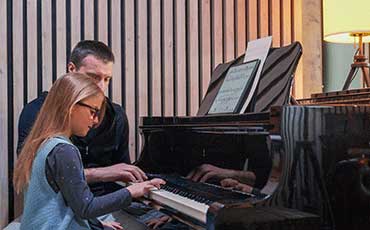From non-stop fun to getting an artistic flair, there are numerous benefits to our music lessons for children. Our teachers are well-equipped and experienced in the art of music. Our students, in particular, have the choice to pursue any genre they wish to master.
From enhanced communication skills to securing a creative flair, music lessons allow children to explore a variety of learning avenues. The earlier the children are given a creative outlet, the better it is for their all-round development.
Learning music is a rewarding experience and it allows children to refine their social and interpersonal skills. Moreover, research shows that music can help children to improve their academic success.
At The Young Musician Music Institute, we nurture talents and offer a rewarding learning experience to your children. Let us discuss how music education benefits students and make them better equipped for their future.
Music Stimulates Brain Development
Several studies suggest that music stimulates brain development faster in children. A study compared the neural processing of the students who play an instrument to those who only listen to music. It is found that children who played an instrument had an improved neural processing.
Another study found improved IQ levels of children who attended music lessons as compared to those who weren’t engaged with music. Also, people who take music training have enhanced comprehension and auditory processing. All these improved abilities translate into heightened problem-solving skills and in processing information.
Music Enhances Retention
Learning music requires improved retention ability. While learning music, students must read the music notes by sight, play the same on their instruments, and memorize the lyrics. The entire learning process helps to strengthen the memory centre of the brain. Improved memory allows students to concentrate on other subjects more intensely.
Music Reinforces Hand-eye-ear Coordination
Musical instruments are regarded as the ideal way to improve hand-eye-ear coordination while enhancing dexterity.
Playing an instrument requires to read the notes while hitting the right keys or strings to create perfect music. Moreover, in instrument training, students have to follow the rhythm, read the music, and sometimes are required to sing-along.
Decoding, mimicking the dotted notes, and translating it into music gives a rigorous work out for their brains. Musical training fine-tunes our hand-eye-ear coordination and helps enhancing the overall motor skills.
Music Refines Discipline And Patience
Excelling at playing an instrument and singing come with a steep learning curve. Children learn delayed gratification and discipline to continue honing their skills.
Learning an instrument or mastering vocals makes children realise that they have to dedicate days, months, or even years without expecting an immediate reward. As the child advances in learning music, they are aware that patience and discipline are keys to their success.
Music Teaches Teamwork
Typically, music is thought of as a way to translates one’s expressions. While music fosters individual expression, it also educates children about teamwork. This teamwork is evident in musical training at schools.
In such training classes, students strive together to conduct a cohesive performance. They consider themselves as a part of a community supporting each other in their ambitions. These training classes allow students to appreciate a sense of belonging and bond with like-minded children.
Music Nurtures Creativity
Music nurtures the creative side of students. It allows students to think out of the ordinary and develop a unique perception. During music training, students are required to view & analyze the music scores differently and then interpret it uniquely. This can help them to always come up with creative ideas in their lives.
In fact, ‘The Arts Education Partnership’ suggests that creativity is one of the traits sought by many employers. Music lessons help to promote creativity and allow students to refine throughout their training.
Even graduates from music programs confirm that creativity, along with critical thinking and communication skill is the core competencies essential for their work.
Music Increases Spatial-temporal Skills
Music is known to increase spatial intelligence in children. Increased spatial intelligence means better understanding and visualization of different elements. This skill would help students in gauging and solving math problems in a better way.
Also, students can benefit from enhanced spatial intelligence when working with computers or pursuing engineering as their professional path.
Music Improves Test Scores
Several studies established that students who take music lessons performed academically better than those with no music training. A study showed that students in schools with high-quality music education achieved 20% higher scores in math and 22% higher scores in English than those schools with inferior music training programs.
Music education plays a crucial role in ensuring all-round development of students. When taught with other core subjects, music helps them in building self-esteem, refine essential skills, and prepare for future prospects.
At The Young Musician Music Institute, we focus on discovering your creativity and helping it to reach its full potential. Our expert music teachers inculcate a life-long passion and drive for music in students. We strive to offer our students an arena where they can bond with like-minded people as a fraternity.

